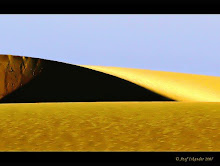For me, sharing is an activity rather than an entity, a consciousness of, and reverence for, our all too often unjustice-stricken and physically ill world.
Should sharing be unencumbered by any moral or social purpose?
The hegemony of the eye is very strong in our culture. It is time to challenge the commitment to its ocular-centric, “We need to see results” vision-centred aesthetics. Replacing this paradigm with a shift from vision to the very different attitude of listening (and actively responding) to someone/something else, means recognizing that sharing is a form of social work or service.
When sharing is actively engaged with the world, its aesthetic quality is not necessarily compromised. If we consider sharing as a practice, then sharing is an art, an art in the service of something. As a ritual of serving (ars and ritus share the same root, in Latin), sharing may be intensely aesthetic (from the Greek verb aisthànomai, “to feel”), because in responding compassionately (=aesthetically) to whatever it touches, it is helping to create a more beautiful world.
Until the paradigm shift from a vision- to an action-sharing is enacted completely, we will continue to approach our world much as we approach our cars. As held by James Hillman in his interview with Scott London, we go to a doctor and ask:
"What's wrong with it, how much will it cost, and when can I pick it up?" We can't change anything until we get some fresh ideas, until we begin to see things differently.
Sharing may help create a therapy of ideas, actively bringing in new ideas so that we can see the same old problems differently.
The question, then, may be not what sharing should do (sharing is an activity, not an entity), but rather, what it could better serve. Can we change that to which it is in service?
Sunday, November 23, 2008
Saturday, November 22, 2008
shell - conchiglia
shell
what remains of the lake
in one hand
conchiglia
quel che resta del lago
in una mano
what remains of the lake
in one hand
conchiglia
quel che resta del lago
in una mano
Tom, Vukovar, ex Yugoslavia
plotone d'esecuzione
quando la pelle gela
che sia già inverno?
firing squad
is it winter yet
when the skin chills?
18 November 1991
quando la pelle gela
che sia già inverno?
firing squad
is it winter yet
when the skin chills?
18 November 1991
Sunday, November 16, 2008
Nel Labirinto
"Oh, re del tempo e sostanza e cifra del secolo!
In Babilonia mi volesti perdere
In Babilonia mi volesti perdere
in un labirinto di bronzo con molte scale, porte e muri;
ora l'Onnipotente ha voluto ch'io ti mostrassi il mio
dove non ci sono scale da salire, ne' porte da forzare,
ne' faticosi corridoi da percorrere, ne' muri che ti vietano il passo."
J.L. Borges, I due re e i due labirinti
Nel labirinto l'altro è detenuto dalle nostre parole, l 'altro è un mostro, un alieno. Un altro, se menetre noi siamo lui non è - non gli riconosciamo la libertà di essere, quella stessa libertà da cui lo teniamo in cattività, prevedendolo attraverso le parole che lo condannano alla paura o alla brama che ne abbiamo. E' altro, ossia si trova in un altro tempo: è (già) una minaccia; sarà quanto abbiamo desiderato. In ogni caso, il tempo dell'altro viene dettato dalle nostre parole. L'altro è in nostra funzione un ostacolo o un mezzo. Nient'altro. E' altro, è rumore di fondo. Uno sfondo per le nostre parole.
Il labirinto è un cammino che conduce al silenzio. Un silenzio che ha a che vedere con la sincerità - talmente presente, talmente nuda che nessuna parola, interesse o umiliazione, egoismo, neanche i nostri, possono aggiungere qualcosa. E nulla può aggiungersi davvero a una presenza, a qualcosa che si mostra. Qualcosa che affronta le nostre parole, e fa ammutolire. Un volto nudo che pietrifica, come quello di un dio.
Il labirinto è un tempio. Chi vi entra osserva che l'unico essere a non pregare è proprio il dio. Questo perché nel tempio il dio è l'unico ateo: non ricerca un fuori. E' in ogni luogo come è, è lì dove viene visto. Non parla: cosa dovrebbe aggiungere alla propria presenza?
Il labirinto, per un uomo come per un dio, è il luogo dove diventare fedele. Dove credere non a una parola, ma a una presenza. Le parole dicono, Sii te stesso. La presenza si spoglia delle parole, Non sei questo, Non sei questo.
Il labirinto è il luogo della manifestazione, dove l' uomo affronta l'altro, gli si presenta fuori da se stesso. Uscendo dal tempo delle parole. Rivelando la durata di ciò che compie.
La parola aspira a essere, a restare. Il labirinto non è un luogo in cui rimanere, è il luogo in cui diventare eterni. Non è essenziale che questo luogo sia un labirinto o ne abbia il nome. E' necessario solo che questo luogo esista.
Un labirinto contiene le parole da cui diventiamo liberi. L'insieme di queste parole sono pagine, fogli con un'unica soluzione: il silenzio. Le parole di cui ci spogliamo scrivono il libro che non descrive: una conquista, una violenza, una fondazione, ma ammette il proprio limite: noi. Davanti a noi, quando finalmente ci riveliamo esercitando la nostra presenza, le parole tacciono, e stanno a guardare.
Sunday, November 9, 2008
Sharing One's Journey
The flowers in one of my gardens (see right, The Garden of Haiku) are already somewhat old, having been painted in 1998, 1999 and 2000, during long months spent in Sweden, Finland, Norway and Iceland. What are the stories these flowers tell, under the Northern lights, or during the so called Yoton Yo (Nightless Night) occurring in the Nordic summer? Those flowers were fellow travellers, changing from time to time: silently growing along the road, and risking being stepped on carelessly; raved by the wind, bitten by the cold, or plucked in anger, these can be exotic flowers, traded for dear money so as to fill the void in a room, illuminate a grey day, but also humiliate with their magnificence.
Flowers exposed to usage, rain, love, violence; all of which, sooner or later, wither. These paintings know and suggest the contours of the stories these flowers incarnate, just like the hands that touch - and are sometimes stung by - them.
I fiori di questo giardino (a destra, The Garden of Haiku) hanno già qualche anno, essendo stati dipinti nel 1998, 1999 e 2000, durante lunghi mesi trascorsi in Svezia, Finlandia, Norvegia e Islanda. Quali sono le storie che i fiori raccontano sotto le aurore boreali, o durante la notte-senza-notte dell'estate nordica? I fiori sono compagni di volta in volta diversi: crescono in silenzio agli angoli della strada, con il rischio di essere schiacciati da un passo distratto, rovinati dal vento, morsi dal gelo, o strappati per rabbia; oppure sono fiori esotici, acquistati a caro prezzo per riempire il vuoto di una stanza, illuminare il grigiore di una giornata, ma anche umiliare con il loro sfarzo.
Sono fiori esposti all'uso, alla pioggia, all'amore, alla violenza; tutti, presto o tardi, avvizziscono.I disegni conoscono e suggeriscono i contorni delle storie di questi fiori, come le mani da cui sono toccati e che a volte pungono.
Tuesday, November 4, 2008
Sharing, Monostrophic Innumerable
 "In their song, which they call the yoik, one cannot discern any particular art at the first hearing, and one is tempted to believe that they are crying rather than singing. However, it does not sound quite so bad when one listens to them without prejudice." [P. Hogstrom, 1747]
"In their song, which they call the yoik, one cannot discern any particular art at the first hearing, and one is tempted to believe that they are crying rather than singing. However, it does not sound quite so bad when one listens to them without prejudice." [P. Hogstrom, 1747]A possible understanding of the Sami yoik, "the most ancient and original form of music that exists within the boundaries of Europe" according to Ernst Emsheimer, lies in the light of its function in Sami society.
"There are no rhymed ends, but they repeat the same words often and in many ways, whereby a subject of no value can become both important and pleasant. To that end, namely as regards the repetition of the words, I cannot give a closer example than Deborah's Song in the Book of Judges." [P. Hogstrom, 1747]
All the people listening to the yoik in its original environment had common experiences of the places described or of the persons referred to. This means that it was only necessary to hint at what was intended by means of certain words or short sentences. Sometimes just the music was enough. The wordless syllables would give the listener free associations where each person could insert own experiences and feelings related to the object of the yoik:
"To live meant to exist in relation to other people. As long as someone was remembered and as long as those who survived him/her thought about and continued to remember him/her, that person continued to remain alive. The person who was forgotten and lacked human relations was regarded as dead - even though his/her heart still continued to beat." [R. Kjellstrom]
In situations where people knew each other, as sharing the same environment and milieu, it was habitual for common memories to be also shared on the occasion of gatherings. After being composed, a yoik was often learnt by others, eventually becoming the common property of all the community...
Monday, November 3, 2008
In gardens
 A garden is a room populated with trees and plants. For some, it is a room to be shared with friends or relatives, a room which can be visited and where time is spent.
A garden is a room populated with trees and plants. For some, it is a room to be shared with friends or relatives, a room which can be visited and where time is spent.Even time visits gardens, time of an atmospheric quality - that which we call weather; and, time as the energy which visits all beings, dwells in them and allows them to be living and animated.
Many things occurr in a garden - the changing of seasons, the aging of trees, the withering of leaves from green into yellow, the blossoming of buds on barren branches, the shadow and light… anything happening is suggestive of metaphors - it resumes images taken from our inner life.
Thus, visiting a garden gives us pleasure, delight, charms and soothes us or reflects our worried, troubled mind. The experience of the garden is one of true sharing among living beings, between nature and man, as the garden is the living image of our inner contents.
Even the mere act of visiting one, and simply letting our eyes rest on its composite flora, is a kind of practice. For that which is taking place in the garden, at the unfolding of seasons, speaks of our life and of its changes, tosses and turns. The garden neither shuns away nor judges - in fact, it is a host whose door is open to any human being and gives them room to be face to face with the expressions of their mind.
Subscribe to:
Posts (Atom)






